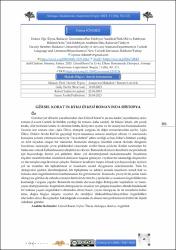| dc.contributor.author | Sönmez, Fatma | |
| dc.date.accessioned | 2024-02-05T15:58:18Z | |
| dc.date.available | 2024-02-05T15:58:18Z | |
| dc.date.issued | 2023 | |
| dc.identifier.issn | 2147-2610 | |
| dc.identifier.uri | https://doi.org/10.33692/avrasyad.1295534 | |
| dc.identifier.uri | https://search.trdizin.gov.tr/yayin/detay/1197335 | |
| dc.identifier.uri | https://hdl.handle.net/20.500.12462/13952 | |
| dc.description.abstract | Cumhuriyet dönemi yazarlarından olan Gürsel Korat’ın şu ana kadar yayımlanmış sekiz romanı (Levent Cantek ile birlikte yazdığı iki romanı daha vardır), iki hikâye kitabı, altı çocuk kitabı, dört inceleme kitabı, iki deneme kitabı, iki tiyatro oyunu ve bir senaryosu vardır. Yazarın son romanı olan Uyku Ülkesi, distopik kurgusu ile diğer romanlarından ayrılır. Uyku Ülkesi, Doktor Sevda Kül’ün geçirdiği beyin kanaması sonucu ameliyat olması ve sonrasında konuşma yetisini yitirmesi nedeniyle “rüya defteri” adını verdiği ve kızı Nihal’e hitaben yazdığı on dört rüyadan oluşan bir romandır. Romanda distopya öncelikli olarak ekolojik dengenin bozulması nedeniyle çevre problemleri ekseninde verilir; buna şiddetin iktidar tarafından bir baskı aracı olarak kullanılmasının eleştirisi de eklenir. Romanda iktidarın kendisini meşru kılmak için başvurduğu birinci yol şiddettir, ikinci yol denetim/jurnal mekanizmasıdır. İnsanların rüyaları monitörlerden izlenilerek iktidarın hoşuna gitmeyen veyahut da istemediği düşünceler ve davranışlar engellenmeye çalışılır. İktidarın kendisini meşru kılmak için başvurduğu üçüncü yol ise insanları tek tipleştirmesi ve insanların adalet duygusunu zedelemesidir. Tüm bu distopyalar (şiddet, denetim/jurnal, tek tipleştirme ve adalet) aslında insanların temek hak ve hukuku olan özgürlüklerinin kısıtlanmasına bir göndermedir. Romanda, yüzeyde iki yerde özgürlük distopyası görülse de aslında romanın bütününde tüm bu yapılanlarla insanların özgürlüklerinin kısıtladığı vurgusu yapılır. Romanda üzerinde durulan diğer distopyalar kapitalizm ve basın-yayın distopyalarıdır. Kapitalizm distopyası ile insanlar zor çalışma koşulları altında bırakılarak bir bakıma yaşam özgürlükleri ellerinden alınır; basın- yayın distopyası ile de insanların haber alma, doğru bilgiye ulaşma veyahut da istediğini dinleyebilme/okuyabilme özgürlükleri ellerinden alınır. Bu açılardan bakıldığında romanda ele alınan tüm problemlerin birbiri ile ilişkili oldukları görülür. | en_US |
| dc.description.abstract | Gürsel Korat, who is one of the writers of the Republican period, has eight novels published so far (he also has two more novels written with Levent Cantek), two story books, six children’s books, four review books, two essay books, two theater plays and a script. Uyku Ülkesi, the author’s last novel, differs from other novels with its dystopian fiction. Uyku Ülkesi is a novel consisting of fourteen dreams that Doctor Sevda Kül called “dream book” because of the brain hemorrhage she had undergone surgery and subsequently lost her ability to speak and which she wrote to her daughter Nihal. In the novel, dystopia is primarily given on the axis of environmental problems due to the deterioration of the ecological balance; to which is the criticism of the use of violence as a tool of oppression by the government is added. In the novel, the first way the rulership uses to legitimize itself is violence, the second way is the control/denunciation mechanism. By watching people’s dreams on monitors, thoughts and behaviors that the government does not like or do not want are tried to be prevented. The third way that the government uses to legitimize itself is to standardize people and damage people’s sense of justice. All these dystopias (violence, control/denunciation, standardization and justice) are actually a reference to the restriction of people’s fundamental rights and freedoms. Although a dystopia of repression is seen in two places on the surface in the novel, in fact, it is emphasized throughout the novel that people’s freedoms are restricted by all these actions. Other dystopias emphasized in the novel are capitalism and media dystopias. With the dystopia of capitalism, people are left under difficult working conditions and in a way, their freedom of life is taken away from them; With the press-broadcast dystopia, people are deprived of their freedom to receive news, access the right information, or listen/read whatever they want. From these perspectives, it is seen that all the problems discussed in the novel are related to each other. | en_US |
| dc.language.iso | tur | en_US |
| dc.relation.ispartof | Avrasya Uluslararası Araştırmalar Dergisi | en_US |
| dc.rights | info:eu-repo/semantics/openAccess | en_US |
| dc.rights | Attribution-NonCommercial 4.0 International | * |
| dc.rights.uri | https://creativecommons.org/licenses/by-nc/4.0/ | * |
| dc.subject | Gürsel Korat | en_US |
| dc.subject | Uyku Ülkesi | en_US |
| dc.subject | Distopya | en_US |
| dc.subject | İktidar | en_US |
| dc.subject | Özgürlük | en_US |
| dc.subject | Dystopia | en_US |
| dc.subject | Power | en_US |
| dc.subject | Freedom | en_US |
| dc.title | Gürsel Korat’ın Uyku Ülkesi romanında distopya | en_US |
| dc.title.alternative | Distopia in Gürsel Korat’s novel of Uyku Ulkesi | en_US |
| dc.type | article | en_US |
| dc.contributor.department | Balıkesir Üniversitesi | en_US |
| dc.identifier.volume | 11 | en_US |
| dc.identifier.issue | 36 | en_US |
| dc.identifier.startpage | 301 | en_US |
| dc.identifier.endpage | 321 | en_US |
| dc.relation.publicationcategory | Makale - Ulusal Hakemli Dergi - Kurum Öğretim Elemanı | en_US |
| dc.buozel | trdizinideal | en_US] |
| dc.department-temp | Balıkesir Üniversitesi, Fen-Edebiyat Fakültesi, Türk Dili ve Edebiyatı Bölümü, Yeni Türk Edebiyatı Anabilim Dalı, Balıkesir, Türkiye | en_US |
| dc.identifier.trdizinid | 1197335 | en_US |
| dc.identifier.doi | 10.33692/avrasyad.1295534 | |



















